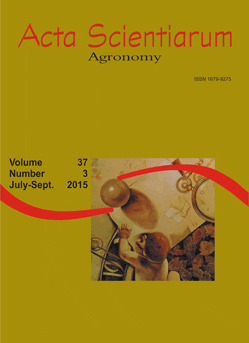<b>Vegetative growth response of cotton plants due to growth regulator supply via seeds
Abstract
The global cotton industry is distinguished by its numerous industrial uses of the plume as well as by high production costs. Excessive vegetative growth can interfere negatively with productivity, and thus, applying growth regulators is essential for the development of the cotton culture. The objective of this study was to evaluate the development and yield of the cotton cultivar FMT 701 with the application of mepiquat chloride to seeds and leaves. The experimental design used a randomized block design with four replications, arranged in bands.The treatments consisted of mepiquat chloride rates (MC) (0, 4, 6, 8 and 10 g a.i. kg-1 of seeds) applied directly to the cotton seeds and MC management by foliar spray using a 250 mL ha-1 rates that was administered under the following conditions: divided into four applications (35, 45, 55 and 65 days after emergence); as a single application at 70 days; and without the application of the product. The mepiquat chloride applied to cotton seeds controls the initial plant height and stem diameter, while foliar application reduces the height of the plants. After application to seed, foliar spraying MC promotes increase mass of 20 bolls, however no direct influence amount bolls per plant and yield of cotton seed. Higher cotton seed yield was obtained with a rate of 3.4 g a.i. MC kg-1 seeds.
Downloads
DECLARATION OF ORIGINALITY AND COPYRIGHTS
I Declare that current article is original and has not been submitted for publication, in part or in whole, to any other national or international journal.
The copyrights belong exclusively to the authors. Published content is licensed under Creative Commons Attribution 4.0 (CC BY 4.0) guidelines, which allows sharing (copy and distribution of the material in any medium or format) and adaptation (remix, transform, and build upon the material) for any purpose, even commercially, under the terms of attribution.





















































